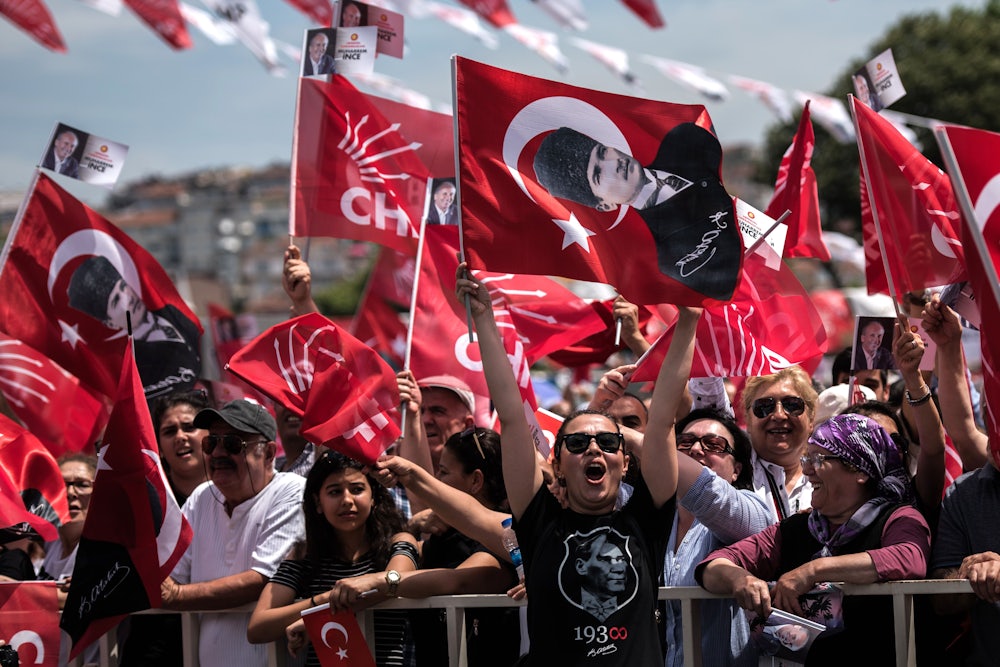When it comes to winning elections, Turkey’s president, Recep Tayyip Erdogan appears to be a master. He and his conservative Justice and Development Party, commonly known through the initials AKP, have dominated every Turkish election since 2002 with impeccable political timing and adaptation.
In 2002, taking advantage of the growth opportunity for emerging markets, Erdogan turned on his renowned charm and spoke about not only economic growth and opportunity but increased civil liberties and individual rights. More recently, as anti-Muslim sentiment and populism spread throughout the world, Erdogan dug into the authoritarian playbook and rolled out policies “to protect” Turkey and Turkish identity. That has included curbing the press, shutting down social media, jailing political opponents, antagonizing the Kurds, and using a failed coup attempt in July 2016 to impose a state of emergency. Nine months later, he managed to win a referendum to change Turkey’s constitution, giving the winner of the next election vast powers of an “executive presidency.”
In anticipation of further economic decline, Erdogan cannily moved Turkey’s next elections from November 2019 to this Sunday, June 24 two months earlier. His reasoning, presumably: to sidestep economic discontent and the vicissitudes of the youth vote. According to the Turkish polling company, Konda, out of 57 million voters about 19 million are under 32. Half of them say that they don’t support any party.
But as opposition parties seize the moment, mounting a formidable coordinated challenge with the very tactics that catapulted the Turkish president to power, it finally seems the master may have miscalculated.
Erdogan has profited in the past from a persistently weak and pathetic opposition. Few of Turkey’s half-a-dozen opposition parties have been able to put forward a convincing platform, much less a convincing leader. This is particularly true for the main opposition People’s Republic Party (CHP), the party of the founder of the Turkish republic, Mustafa Kemal Ataturk.
In March, the AKP-dominated parliament passed a bill that enabled political parties to run as part of a coalition, circumventing the requirement that an individual party achieve a 10 percent of votes into order to enter parliament. The AKP did so to avoid a repeat of the June 2015 election results, when the party garnered a plurality of 40 percent and, hence, lacked the necessary majority to form a government. Hence, in collaboration with the National Movement Party (MHP) and the Great Unity Party (BBP), it formed the People’s Alliance—Cumhuriyet Ittifaki.
In response, four opposition parties, led by the CHP, formed the National Alliance—Milliyet Ittifaki. It includes an offshoot of the nationalist MHP, led by the dynamic Meral Aksener—one of the few women in Turkish politics. Together, they have embraced a united platform focused on the very issues that catapulted Erdogan to the prime minister’s seat in 2003—minority rights, democratic freedoms, and the economy.
Turkey’s economy has been on the decline since the global financial crisis in 2008. Foreign investments that once flooded the country have dried up and the growth that propelled Turkey into the G-20 has slowed. A combination of a rising U.S. dollar and market uncertainty about Erdogan’s monetary policy, including unorthodox beliefs about high interest rates causing inflation, has led to the Turkish lira dropping one fifth of its value in the past year. Turkish unemployment has been on a steady rise since 2012, standing over 10 percent.
In response, the once economically adept Erdogan has spoken about opening up “kiraathanes”—reading houses with free coffee, tea, and wifi. It is a far cry from his old policies focusing on job creation, trade expansion, and entrepreneurship. Instead, it is Muharrem Ince, the CHP candidate and a former physics teacher, that speaks about revitalizing manufacturing, expanding agriculture, and bringing back jobs to Turkey through policies that would attract both local and foreign investors and skills training for Turkish youth.
Ince, along with his counterparts in the National Alliance, also speaks about religion, diving into an area that Erdogan one ruled: identity politics. Given how weak the country’s institutions and rule of law are, Turks have voted for politicians they feel represent and resemble them ethnically and religiously. Erdogan once gave voice to minorities, particularly the Kurds, along with the majority that embrace Islam as part of their daily lives. Today, Ince and the National Alliance speak about teaching Kurdish as a second language, praying, and embracing women in headscarves as our “sisters.” The media has made much of the fact that Ince’s sister wears one.
In 2002, Erdogan frequently spoke about growing up in a working-class neighborhood in Istanbul and representing the “black Turks”—the long-ignored, largely rural and traditional underclass that Turkey’s secular “white Turk” elite spurned. Today, Muharrem Ince, who like Erdogan hails from Turkey’s Black Sea region, dives into crowds to folk dance and eschews scripted speeches in favor of fiery rhetoric about a Turkey for “the common man.”
Erdogan, however, still holds many of the cards in his favor. Media is largely under state control, giving enormous airtime to Erdogan and his message and little to anyone else. Erdogan has made it difficult for Kurds, who hold 19 percent of the vote, to get to polling stations. Out of concerns for “security,” Turkey’s High Electoral Board (YSK) relocated polling stations in the Kurdish-dominant southeast. Over 100,000 voters will have to travel further and across precarious roads to reach the ballot box.
Erdogan is also a known figure, with an impressive track record. That matters in a country in which trust lies in the “man.” The question Turks will have to answer on Sunday is whether that man, Recep Tayyip Erdogan, who has worked to garner unprecedented power, should go ahead to rule alone. At stake is the transformation of Turkey’s government, which voters in 2017 narrowly voted to move from a parliamentary system to a presidential one. That makes this election not just vital for the next few years in Turkey, but the country’s entire future.
